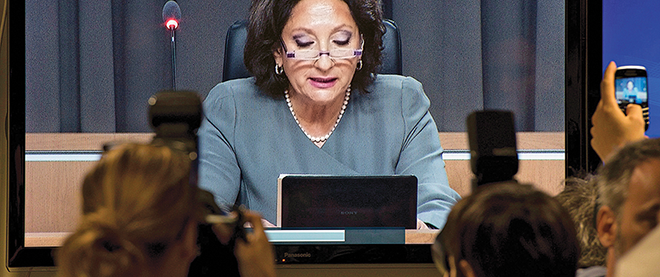Quebec’s corruption problem
While the values charter has dominated debates outside Quebec, corruption has riled those within
Ryan Remiorz/CP
Share

If you are a Quebecer and you’ve heard of the so-called “charter of Quebec values”—and chances are, you have—then it’s mission accomplished for the Parti Québécois. The sovereignist party has promoted its proposed legislation, which would ban the wearing of “conspicuous” religious symbols by public sector workers, by way of strategic media leaks and a nearly $2-million ad campaign. The PQ has made no secret of its desire to use the charter as its warhorse in the next election, which may come as soon as this spring.
Yet for all its hype, the charter legislation has only entrenched Quebecers into “for” and “against” camps in roughly equal numbers, according to successive polls. What’s more, despite how every Quebecer seems to have an opinion on whether government workers should be able to wear religious garb, few consider the matter as important as the PQ might like. A Léger poll last fall suggested only seven per cent of Quebecers thought such a charter should be a government priority.
Quebecers, it seems, are far more interested in fighting corruption within government. Quebec’s other obsession, which has taken a backseat to the charter’s sound and fury, remains a top priority in the province, after governmental spending and tax reductions, according to the same poll. In fact, the four-year inquiry into corruption within the province’s construction industry will have far more impact on who forms the next government than what religious accoutrement a government worker may or may not wear.
It’s a wonder the PQ hasn’t yet exploited the corruption angle. If the past is any prologue, the Charbonneau commission, as the inquiry is known, will be more of a political liability for the opposition Liberals in the coming year.
Since its inception in October 2011, the Charbonneau commission has investigated corruption of all sorts, uncovering long-running, widespread price-fixing schemes among construction companies bidding on municipal governments in and around Montreal. It established the existence of a similarly long-running pattern of illegal donations to the province’s major political parties from some of its biggest engineering firms. And it shed light on the perturbing relationship between the FTQ, the province’s biggest union federation, and alleged members of organized crime.
While the Parti Québécois hasn’t exactly escaped unscarred—the party has long-standing ties with the FTQ, and was found to have solicited illegal donations by the province’s electoral authority—Quebec’s Liberal party has fared much worse. Two former Liberal cabinet ministers, Michelle Courchesne and Nathalie Normandeau, have been named during the hearings, both for Liberal fundraising activities.
Coincidentally or not, the lion’s share of illegal donations has been found to have gone to the Liberals. UPAC, the province’s anti-corruption police task force, has conducted raids on the Liberal headquarters and several construction companies of former Liberal fundraiser Marc Bibeau. “There are individuals who commit bad acts in every party,” says Quebec Liberal party spokesperson Gabrielle Collu. “We hope light is shined on all corruption, and that people who are guilty answer for their actions. Our members are sick of being associated with corruption.”
The Liberals’ brave face aside, there are certain parallels between the party today and its 1970s incarnation, according to former crime journalist, PQ politician and current political analyst, Jean-Pierre Charbonneau (no relation). In 1972, Liberal premier Robert Bourassa called a commission into organized crime after a police anti-corruption squad found links between Montreal’s police chief and the Cotroni crime family.
The subsequent inquiry, known as CECO, uncovered further links between the Cotroni family and Pierre Laporte, Bourassa’s former labour minister. CECO, Charbonneau says, “hurt Bourassa. It got worse and worse and ended with him losing the election in 1976.” That year, the PQ campaigned more on cleaning up corruption than on the thorny issue of sovereignty. It won by a crushing majority.
The Charbonneau commission resumes in January, and will focus on Quebec’s transportation ministry and political fundraising—two particularly sensitive areas for the Liberals, given the party’s ties to construction companies and its documented ability to harvest illegal donations. The PQ, meanwhile, seems nonplussed. “I don’t have much worry about what is going to come out during Charbonneau,” PQ director-general Sylvain Tanguay says. In fact, the governing party may be looking forward to it.